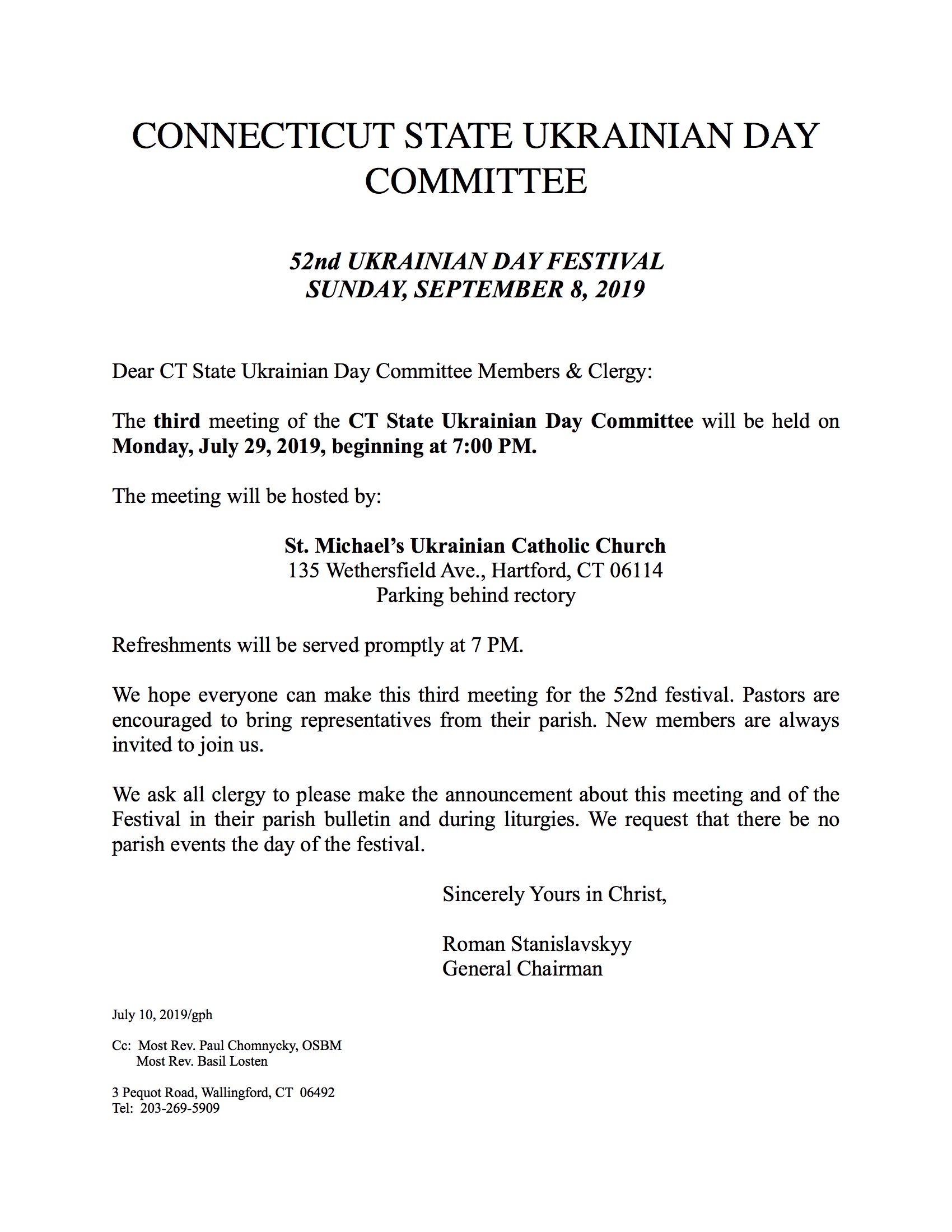
Whale Watch
The Menunkatuck Audubon Society and members of St. Michael the Archangel Ukrainian Catholic Church (New Haven) is sponsoring a Whale Watch from Plymouth, Massachusetts.
The trip is a beautiful event and experience to see whales in their native habit. To register and to purchase tickets online @ https://menunkatuck.org/calendar/whale-watch (you can also send a check to the Menunkatuck Audubon Society)
The Whale Watch is Saturday, August 10, 2019, 1-5pm
More information: https://menunkatuck.org/calendar/whale-watch
OR, email Carl Harvey: carlrharvey79@gmail.com
Humanae vitae at 51
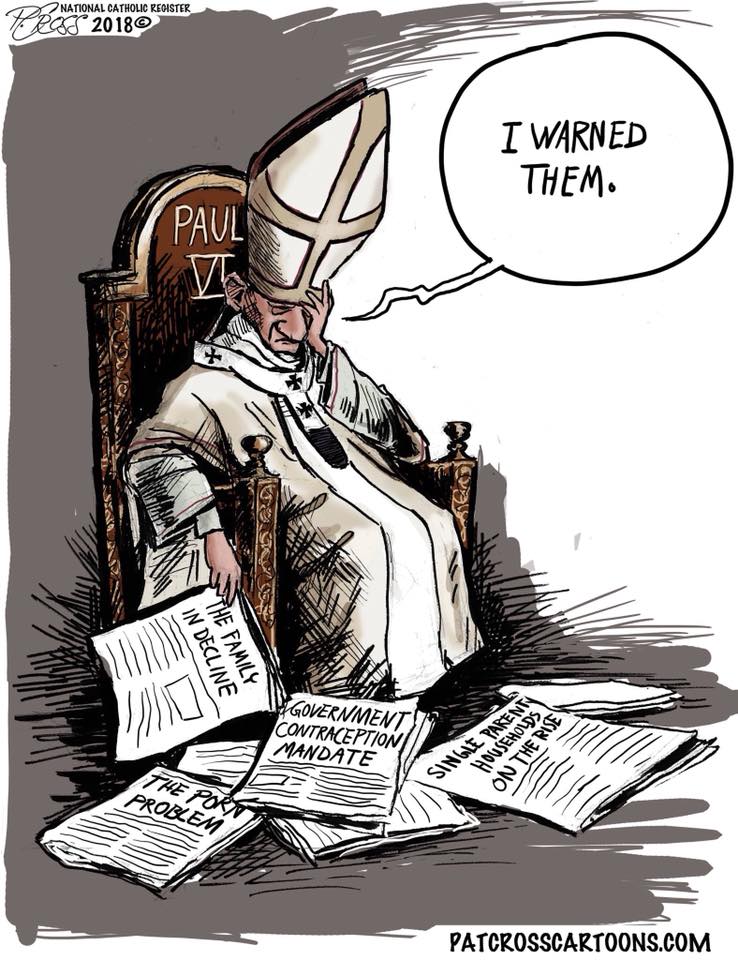
Today is the 51st anniversary of Pope Saint Paul VI’s landmark encyclical, Humanae vitae .
Ss. Boris and Gleb
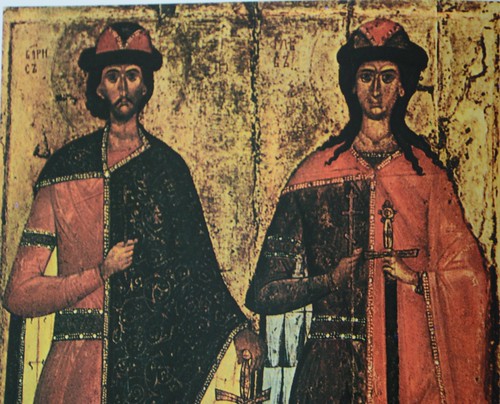 Today is the memorial of the holy protomartyrs of Kievan-Rus’, Boris and Gleb, known in baptism named Roman and David.
Today is the memorial of the holy protomartyrs of Kievan-Rus’, Boris and Gleb, known in baptism named Roman and David.
When the first Christian prince of the Kievan-Rus’ people, St Vladimir, died in 1015, his eldest son, Svyatopolk, attempted to consolidate his own position by eliminating his two half-brothers, Boris and Gleb. When Boris heard of his brother’s plans, he refused to defend himself and faced his death without fear or hatred. His younger brother also accepted his assassination without opposition.
Such murders were typical of the extremes of political struggle for power in a pagan society. Boris and Gleb sincerely believed that the good news of Christ, so recently preached in their own land, must change all of this. Thus, by their voluntary sacrifice to their brother’s lust for power, they bore witness to the command of Christ to love one another. The impact of their witness deeply affected the character of the Kievan-Rus’ spirituality.
Meditation by the New Skete Monks
Edited by PAZ
St Mary Magadalen
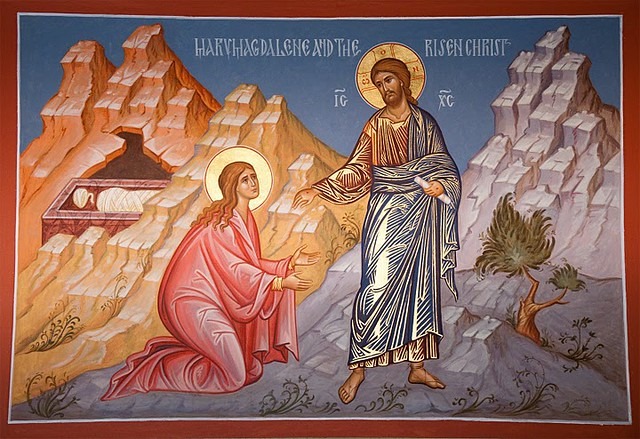 “But Mary stood weeping outside the tomb, and as she wept she stooped to look into the tomb; and she saw two angels in white, sitting where the body of Jesus had lain, one at the head and one at the feet. They said to her, ‘Woman, why are you weeping?’ She said to them, ‘Because they have taken away my Lord, and I do not know where they have laid him.’ Saying this, she turned round and saw Jesus standing, but she did not know that it was Jesus. Jesus said to her, ‘Woman, why are you weeping? Whom do you seek?’ Supposing him to be the gardener, she said to him, ‘Sir, if you have carried him away, tell me where you have laid him, and I will take him away.’ Jesus said to her, ‘Mary.’ She turned and said to him in Hebrew, ‘Rabboni!’ (which means Teacher).” (Jn 20: 11-16)
“But Mary stood weeping outside the tomb, and as she wept she stooped to look into the tomb; and she saw two angels in white, sitting where the body of Jesus had lain, one at the head and one at the feet. They said to her, ‘Woman, why are you weeping?’ She said to them, ‘Because they have taken away my Lord, and I do not know where they have laid him.’ Saying this, she turned round and saw Jesus standing, but she did not know that it was Jesus. Jesus said to her, ‘Woman, why are you weeping? Whom do you seek?’ Supposing him to be the gardener, she said to him, ‘Sir, if you have carried him away, tell me where you have laid him, and I will take him away.’ Jesus said to her, ‘Mary.’ She turned and said to him in Hebrew, ‘Rabboni!’ (which means Teacher).” (Jn 20: 11-16)
I have written several reflections on this passage, throughout the past few years. Today I’m reflecting on it again, because it is the NC-feast of St. Mary Magdalene, who was to be recognized by the Church as “Equal-to-the-Apostles.” On that Sunday morning two millennia ago, she was not “with” the Apostles, but stood alone, “weeping outside the tomb.” And by all indications, she felt very much alone, as if she were the only one who had suffered the loss of “her” beloved Teacher. They have taken away “my” Lord, she says, – not “our” Lord. And she’s trying to get to the bottom of this, on her own: Tell me where you have laid him, she says, and “I” will take him away. I love that! She was going to carry the Body of Christ away, somehow, …perhaps on her back, I don’t know. It’s interesting that she hadn’t thought of appealing to the Apostles, the eleven able-bodied men who might have helped out with this task. There was apparently a disconnect between the “Equal-to-the-Apostles,” Mary, and the Apostles. And when the risen Lord reveals Himself to her (as quoted above), He does not reproach her for this “disconnect,” but does nudge her to “connect,” by sending her off to tell His “brethren,” the Apostles, of her encounter with Him (Jn 20: 17).
My point? Even while we experience certain ups and downs in our “personal” relationship with the Lord, in the Apostolic Church we need not go through these alone. In communion with Christ, we are called to “connection,” or “communion,” also with the rest of His “brethren.” By reaching out for the help of others, when we need it, we also help them, to see the risen Lord at work amongst us, in the “communion of the saints.” St. Mary Magdalene, Equal-to-the-Apostles, pray to God for us!
Meditation by Sister Vassa
Divine Liturgy for the coming week
Glory to Jesus Christ!
Sunday, 7/21, 6th Sunday after Pentecost —Our Venerable Father Simeon, the Fool for Christ and His Ascetical Companion John; the Prophet Ezekiel.
9:00 a.m. Michael and Anna Lipcan requested by Barbara and Patrick Bagley
10:30 a.m. For the people of the parish
Epistle: Romans 12:6-14
Gospel: Matthew 9:1-81, Tone 5
Monday, 7/22, The Holy Myrrh-bearer and Equal-of-the-Apostles Mary Magdalene
9:00 a.m. No intention for the Divine Liturgy
Tuesday, 7/23, The Holy Martyrs Throphimus, Theophilus and Those with Them
9:00 a.m. +Allan Yursha (Pan.) requested by the Family
Wednesday, 7/24, The Holy Martyrs Borys and Hlib, Named Roman and David at Holy Baptism and the Holy Great Martyr Christine
9:00 a.m. No intention for the Divine Liturgy
Thursday, 7/25, The Dormition of Saint Anna, Mother of the Most Holy God-bearer Theotokos and the Holy Women Olympiada and Eupraxia
9:00 a.m. No intention for the Divine Liturgy
Friday, 7/26, The Holy Priest-Martyr Hermolaus and Those with Him
9:00 a.m. No intention for the Divine Liturgy
Saturday, 7/27, The Holy Great Martyr and Healer Panteleimon
9:00 a.m. No intention for the Divine Liturgy
Sunday, 7/28, 7th Sunday after Pentecost —The Holy Apostles and Deacons Prochor, Nicanor, Timon and Parmenas
9:00 a.m. +Frances Dmyterko (13th Anniv.) requested by the Family
10:30 a.m. For the people of the parish
Epistle: Romans 15:1-7
Gospel: Matthew 9:27-35, Tone 6
Parish announcements this week
Christ is in our midst!
This week vigil light is offered to God’s glory by Catherine Kolesnik in memory of all deceased of Kolesnik family.
Physician-Assisted Suicide Presentation: Brother Columba Thomas, O.P., M.D. will present “Physician-Assisted Suicide as a Threat to Society and Human Persons: What Every Catholic Should Know.” This session will be especially helpful to care-givers, healthcare professionals and all seeking ongoing social justice updates. After the presentation a discussion and refreshments to follow. Tuesday, July 23rd, 7-8 p.m., St Joseph Hall, 129 Edwards Street, New Haven.
The ANNUAL HOLY DORMITION PILGRIMAGE will be held on August 10-11 at the motherhouse of the Sisters Servants of Mary Immaculate in Sloatsburg. This year’s theme is “Responding with the heart as did Mary and Josaphata”. The Sisters invite all our parishioners to attend! For information call: 845-753-2840 or http://www.ssmi-us.org
We have for sale frozen borscht for $5.00; cabbage and sausage (kapusta and kovbasa) for $10.00 and pyrohy (varenyky) in 2 dozen packages for $14.00. You can buy pyrohy after each Divine Liturgy or during the week if you call the rectory.
STAMFORD CHARITIES APPEAL
REMINDER: Please don’t forget to donate for Charities Appeal. The forms are designed for each family of our parish. Attached to the form is an envelope into which you can place your contribution. The form along with your contribution, we ask you enclose in the envelope and place it in the collection basket during church services. Please make check payable to the Byzantine Rite Eparchy of Stamford. DO NOT MAIL THIS FORM TO THE CHANCERY OFFICE. We sincerely ask all parishioners to make generous contributions.
The Connecticut State Ukrainian Day Committee wishes to invite all parishioners to attend this year`s Ukrainian Day Festival to be held on Sunday, September 8, 2019. The Festival will be held on the grounds of St. Basil’s Seminary, 161 Glenbrook Rd., Stamford. Advance general admission tickets are $5.00 per person, 12 and over are available from Luba Dubno. Tickets purchases at the gate will be $10.00 per person. This festival can’t exist if volunteers sign up during the day to help out. Please make that effort to volunteer.
The Facilities Maintenance Team of St. Michael’s schedules of work sessions for the entire year so that plans can be developed for doing all the projects and arrangements made for the purchase of required supplies and equipment. The usual time frame for the work sessions will run from 6:30 to about 9:30 p.m. All parishioners are invited to be a part of the team. Call Fr. Iura with your contact information.
CT STATE UKRAINIAN DAY COMMITTEE will hold its next meeting on Monday, July 29, at 7:00 p.m. The meeting will be hosted by St. Michael’s Ukrainian Catholic Church, 135 Wethersfield Avenue, Hartford, CT. Refreshments will be served.
Humankind – in the Image and Likeness of God: The Lord called humankind to holiness in freedom and responsibility: “If you choose, you can keep the commandments; and to act faithfully is a matter of your own choice” (Sir 15:15). God settled humanity in Paradise. He gave them freedom and the commandment to actualize it, symbolized in the prohibition to eat of the tree of knowledge of good and evil: “You may eat freely of every tree of the garden; but of the tree of knowledge of good and evil you shall not eat” (Gn 2:16-17).
The Creator, having fashioned humanity freely out of love, calls us to love – the highest creative expression of a person. For this God grants us freedom. Human love flows from God as from a wellspring, for “God is love” (1 Jn 4:18). Freedom belongs to God’s image in humankind; therefore, his grace does not abolish our freedom. (Christ Our Pascha, 135-136)
St. Elijah the Prophet
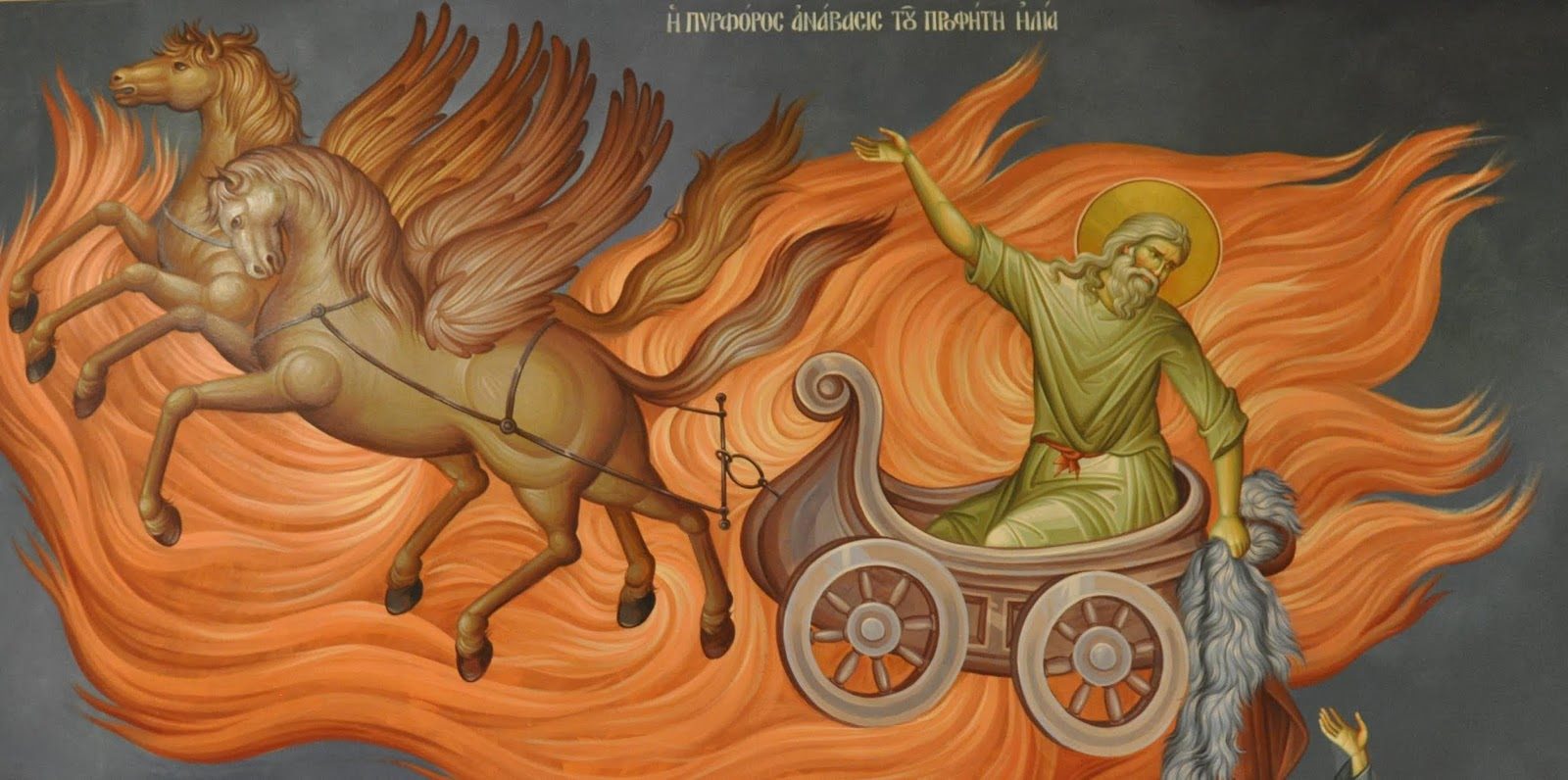 Today, July 20, we celebrate the first man on the moon, July 20, 1969. It was the Feast of St. Elijah the Prophet, who also ascended into the heavens in a fiery chariot. Who says there is not a cosmic connection!
Today, July 20, we celebrate the first man on the moon, July 20, 1969. It was the Feast of St. Elijah the Prophet, who also ascended into the heavens in a fiery chariot. Who says there is not a cosmic connection!
The Holy Great Prophet Elijah was one of the most important saintly figures for the Slav Peoples. In many cases, the peasant people lived in poverty and need from day to day. Elijah gave them hope, for he supplied for the needs of the widow of Zarephath in the time of drought:
“For the Lord, the God of Israel, says: The jar of flour shall not go empty, nor the jug of oil run dry, until the day when the Lord sends rain upon the earth.” (1 Kings 17:14) The farmers depended on the weather for the health of their crops, and very often for their very lives, and it was the Great-Prophet Elijah who was able to call down rain from heaven. Moreover, he was the hope of the future, having ascended into heaven in a fiery chariot, he was awaited as the forerunner of Christ in his second coming. He is for us, a model and rule of faith in God and in Jesus, his Messiah.
ELIJAH THE MAN OF ZEAL – he called down fire from heaven to consume our lawful sacrifice and to destroy the false priests of Baal. Elijah cried out to the Lord: ““I have been most zealous for the LORD, the God of hosts, but the Israelites have forsaken your covenant. They have destroyed your altars and murdered your prophets by the sword. I alone remain, and they seek to take my life.” 1 Kings 19:10 and 14) Therefore, the unfaithful king called Elijah “the disturber of Israel”(1 Kings 18:17) We pray that Elijah will disturb us, arouse us to faith, and strengthen our zeal for the Lord.
ELIJAH THE GIVER OF LIFE – When the widow of Zarephath lost her son, Elijah restored him to life. “Then he stretched himself out upon the child three times and he called out to the Lord: “Lord, my God, let the life breath return to the body of this child.” The Lord heard the prayer of Elijah; the life breath returned to the child’s body and he lived.” (1 Kings 17:21-22)
ELIJAH THE MAN OF GOD – On Mount Horeb, Elijah stood in the presence of God. He experienced the glory of God, not in the storm or the fire or the earthquake, but in the soft, gentle breeze. (1 Kings 19:11-12) We pray that there might be enough peace in our lives that we can hear God’s voice and not drown it out with the noise of our pride and unrest.
ELIJAH THE HOPE OF THE FUTURE – ELIJAH THE BELOVED OF GOD – At the end of his mission on earth, he was taken by God into heaven in a fiery chariot, a sign for the hope of every one of us for life in God.
Let us pray: O Lord, grant us the grace you sent to your great-prophet Elijah and fill us with faith in your Gospel, with hope for your life and with love for you and all your people whom you have brought forth into life, that with him, we may lifted up with him and see your glory.
Meditation by Archpriest David Petras
Mother Maria Skobtsova of Paris
![]() Although the Orthodox Church honors Mother Maria Skobtsova of Paris as a saint, and not as of yet, the Catholic Church, she is a pivotal Christian who needs exposure among the Catholics. A true saint of the 20th century.
Although the Orthodox Church honors Mother Maria Skobtsova of Paris as a saint, and not as of yet, the Catholic Church, she is a pivotal Christian who needs exposure among the Catholics. A true saint of the 20th century.
The historical note reads: “On January 18, 2004, the Holy Synod of the Ecumenical Patriarchate in Istanbul recognized Mother Maria Skobtsova as a saint along with her son Yuri, the priest who worked closely with her, Fr. Dimitri Klépinin, and her close friend and collaborator Ilya Fondaminsky. All four died in German concentration camps.”
One important excerpt from her biography in prison that some day, I can hope to actually apply to us:
“She was on good terms with everyone. Anyone in the block, no matter who it was, knew her on equal terms. She was the kind of person who made no distinction between people [whether they] held extremely progressive political views [or had] religious beliefs radically different than her own. She allowed nothing of secondary importance to impede her contact with people.”
Recommended is Jim Forest’s appreciative essay, “Mother Maria of Parish: Saint of the Open Door.”
St. Macrina
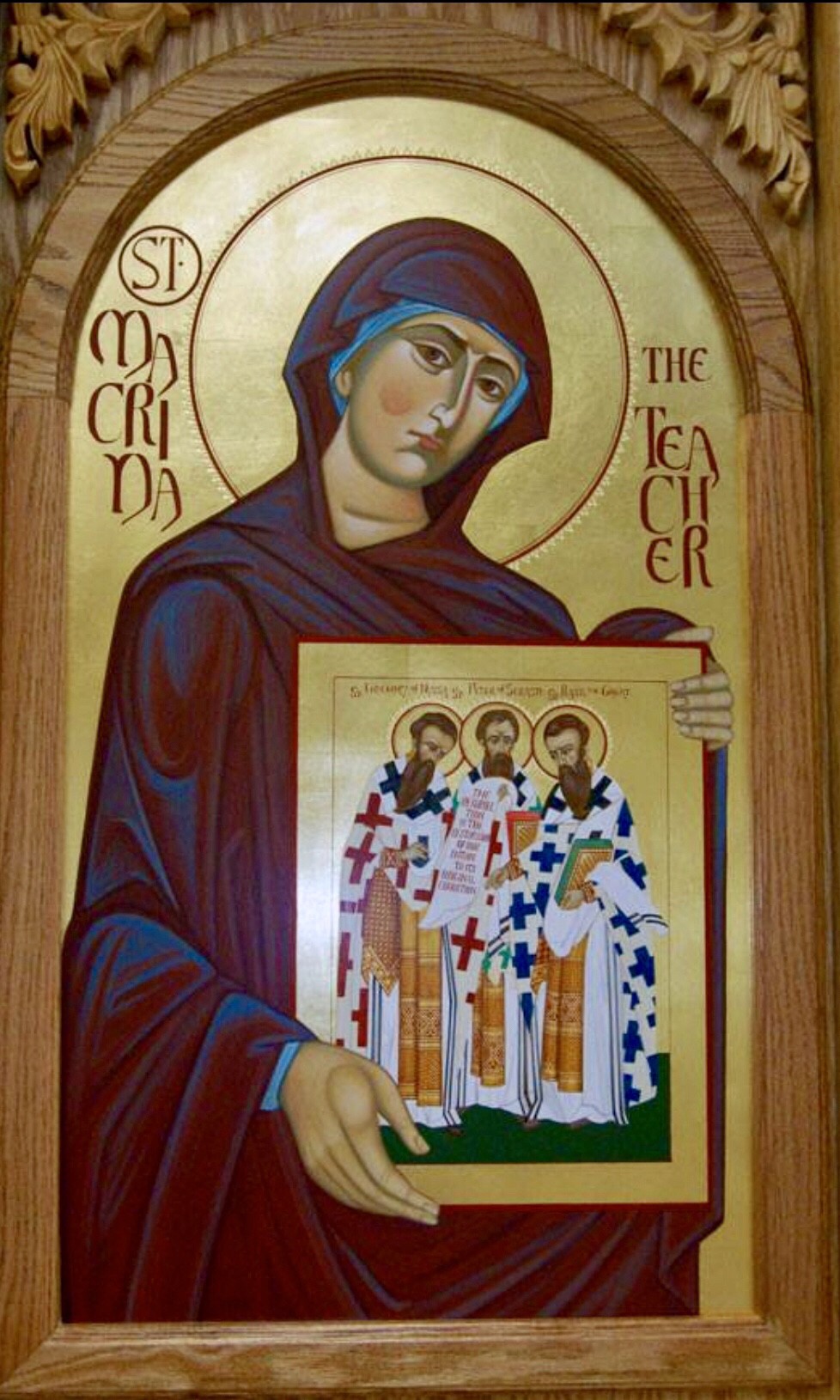 The Byzantine Church liturgically recalls Macrina (the Younger) (c. 330 — 19 July 379), a nun in the Early Christian Church. The churches, East and West, honor her witness. Her younger brother, Saint Gregory of Nyssa, composed her biography focusing heavily on her virginity and asceticism. The Church considers Macrina as a significant personage especially after Nyssa basically set the standards for what it means to be a holy Christian woman. He believed that a life of virginity reflected the “radiant purity of God.”
The Byzantine Church liturgically recalls Macrina (the Younger) (c. 330 — 19 July 379), a nun in the Early Christian Church. The churches, East and West, honor her witness. Her younger brother, Saint Gregory of Nyssa, composed her biography focusing heavily on her virginity and asceticism. The Church considers Macrina as a significant personage especially after Nyssa basically set the standards for what it means to be a holy Christian woman. He believed that a life of virginity reflected the “radiant purity of God.”
Our venerable mother was one of 9 children; several of her siblings were notables, two of whom were the Cappadocian Fathers.
The New Skete monks write of Macrina in this way:
Macrina was the older sister of the saints Basil and Gregory. After the early death of her husband, Macrina devoted herself to the education of her younger brothers. It was at this time, also, that she took up the monastic life, and it was due to her influence that her brothers learned the value of the spiritual life, and dedication to the service of the Church.
The mother of this remarkable family, St. Emelia, guided a small community of nuns on the family estate in Pontus. Macrina succeeded her mother as the head of the monastery, and in time founded other communities for women.
She spent her last days with her brother, Gregory, the bishop of Nyssa. The funeral oration he said over his sister is a moving testament to the love and esteem not only of a brother, but also one of many who were spiritually enriched by her example.
In literature, Gregory of Nyssa composed a “Dialogue on the Soul and Resurrection” (peri psyches kai anastaseos), entitled ta Makrinia (P.G. XLVI, 12 sq.), to commemorate Macrina